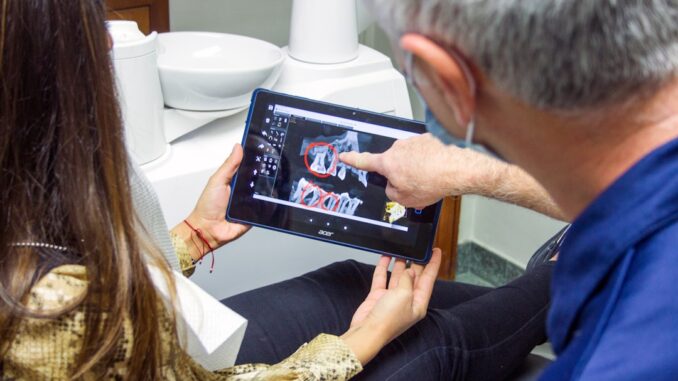
In a significant stride for healthcare technology, Aidoc, an Israeli medical technology company, has raised $150 million to accelerate the development of its clinical-grade foundation model, CARE™. This funding round, co-led by General Catalyst and Square Peg, with participation from NVentures (NVIDIA’s venture capital arm) and four major U.S. health systems—Hartford HealthCare, Mercy, Sutter Health, and WellSpan Health—brings Aidoc’s total funding to $370 million. The investment is poised to bolster Aidoc’s mission to integrate artificial intelligence into clinical decision-making, aiming to support 100 million patients annually within three years. (aidoc.com)
Advancing Clinical Decision-Making with CARE™
Founded in 2016, Aidoc has been at the forefront of AI applications in healthcare, particularly in medical imaging. The company’s CARE™ model is a clinical-grade foundation model trained on multimodal data, already powering FDA-cleared applications such as the rib fractures triage solution. This model enables the development of new indications up to 20 times faster, with plans to cover 90% of clinically relevant diseases, including cancer and cardiovascular conditions, within three years. (aidoc.com)
The CARE™ model’s versatility allows for rapid adaptation to various medical conditions, enhancing diagnostic accuracy and efficiency. For instance, in a recent collaboration with the University of Pittsburgh and Leidos, AI tools developed by Aidoc’s CARE™ model were utilized to produce quick and precise leukemia reports, significantly reducing diagnostic turnaround times. (axios.com)
Expanding aiOS™ for Seamless Integration
In addition to CARE™, Aidoc is investing in aiOS™, an enterprise-grade platform designed to deploy and govern clinical AI at scale. This platform supports both Aidoc and third-party AI solutions, facilitating seamless integration into health system IT infrastructures. The expansion of aiOS™ aims to address the challenges of integrating multiple AI solutions within healthcare settings, ensuring real-time performance monitoring and outcome measurement. (aidoc.com)
The Growing Role of AI in Healthcare
The integration of AI into healthcare is revolutionizing patient care by enhancing diagnostic accuracy and operational efficiency. AI-powered tools are increasingly being used to detect and triage life-threatening conditions, such as brain hemorrhages, aneurysms, fractures, aortic aneurysms, pulmonary embolisms, and strokes. These advancements not only improve patient outcomes but also alleviate the cognitive overload and burnout experienced by clinicians. (calcalistech.com)
Moreover, AI’s potential extends beyond diagnostics. For example, Nanox.AI utilizes artificial intelligence to help identify chronic, asymptomatic conditions early by analyzing routine CT scans. Their FDA-approved systems detect issues in the heart, bones, and liver, showcasing AI’s expanding role in preventive care. (time.com)
Challenges and Considerations
Despite the promising advancements, the integration of AI into healthcare presents challenges. Concerns about data privacy, algorithmic bias, and the need for continuous human oversight remain prevalent. Ensuring that AI systems are trained on diverse and comprehensive datasets is crucial to avoid perpetuating existing health disparities. Ethical considerations, including inclusivity, transparency, and ongoing evaluation, are essential to ensure fair and effective AI implementation in healthcare. (reuters.com)
Looking Ahead
The substantial investment in Aidoc underscores the growing confidence in AI’s transformative potential within healthcare. As the company continues to develop and deploy its AI solutions, the focus will be on expanding its reach and impact, aiming to support 100 million patients annually within three years. This trajectory reflects a broader trend of increasing AI adoption in healthcare, promising more efficient, accurate, and personalized patient care.
References
-
Aidoc Secures $150M for CARE, its Healthcare Foundation Model, to Transform Clinical Decision-Making for 100 Million Patients. (aidoc.com)
-
Nanox.AI utilizes artificial intelligence to help identify chronic, asymptomatic conditions early by analyzing routine CT scans. (time.com)
-
The integration of AI into healthcare is revolutionizing patient care by enhancing diagnostic accuracy and operational efficiency. (calcalistech.com)
-
Despite the promising advancements, the integration of AI into healthcare presents challenges. (reuters.com)


So, AI might detect my aneurysm *before* I book that extra insurance for my skydiving trip? Does this mean I can finally blame a computer for my bad health choices? In that case, can it also write my apology letters for eating the last slice of pizza?
That’s a great point! AI writing apology letters is an interesting application! Perhaps AI could analyze the situation (evidence: empty pizza box) and tailor the perfect, guilt-inducing message. Then you can blame the AI. I am joking of course. Who could resist that last slice?
Editor: MedTechNews.Uk
Thank you to our Sponsor Esdebe
Thanks for your comment! AI-generated apology letters are a fun thought! It really highlights the potential for AI to understand and respond to human emotions, even if it’s just about that last slice. Maybe AI can mediate pizza disagreements in the future.
Editor: MedTechNews.Uk
Thank you to our Sponsor Esdebe
That’s a hilarious, but also insightful, point! The potential for AI to personalize recommendations based on detected health risks (or tempting pizza opportunities!) is fascinating. Thinking about the future of personalized medicine with a humorous slant. Thanks for making me laugh while I’m working!
Editor: MedTechNews.Uk
Thank you to our Sponsor Esdebe
The investment in Aidoc and its CARE model highlights the exciting potential of AI in proactive healthcare. Expanding AI’s role to cover 90% of clinically relevant diseases within three years could significantly shift healthcare from reactive treatment to preventative care.
Thanks for highlighting the shift to preventative care! The potential for AI to proactively identify and address health risks *before* they become critical is a game-changer. Imagine AI helping us all stay one step ahead of health issues! What preventative measures do you think AI will revolutionize first?
Editor: MedTechNews.Uk
Thank you to our Sponsor Esdebe
100 million patients annually? Suddenly feeling a bit inadequate about my contribution to humanity today! Jokes aside, AI streamlining diagnostics means more time for doctors to focus on, you know, actually *caring* for patients. Maybe AI can handle the paperwork too? Just a thought!